
In this lesson, students will learn about audience appeal and analyze how Jefferson chose his arguments and his language to appeal to his particular audience.
- Subject:
- English Language Arts
- Material Type:
- Lesson Plan
- Date Added:
- 09/21/2015

In this lesson, students will learn about audience appeal and analyze how Jefferson chose his arguments and his language to appeal to his particular audience.

This course examines opportunities and problems for entrepreneurs globally, including Europe, Latin America, and Asia. Linkages between the business environment, the institutional framework, and new venture creation are covered with a special focus on blockchain technology. In addition to discussing a range of global entrepreneurial situations, student groups pick one particular cluster on which to focus and to understand what further development would entail. Classroom interactions are based primarily on case studies.

There are three separate lessons on the three branches of government. We recommend starting with the Executive Branch, followed by the Legislative Branch and then the Judicial Branch, as some of the information builds on a previous lesson. Also, students are probably most familiar with the executive branch and they may already know the answers to many of the questions covered in this lesson.
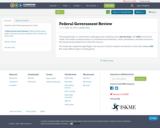
Jeopardy-style federal government review
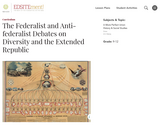
This curriculum unit explores some of the most important arguments of those opposing or supporting the ratification of the U.S. Constitution.
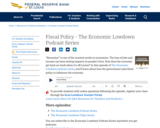
“Recession” is one of the scariest words in economics. The loss of jobs and income can have lasting impacts on people’s lives. How does the economy get back on track when it’s off course? In this episode of The Economic Lowdown podcast series, you’ll learn about how the government uses fiscal policy to influence the economy.
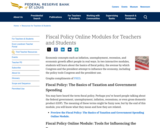
Inflation, unemployment, recession, economic growth—these economic concepts affect people in very real ways. In two thought-provoking, interactive lessons, this course teaches students about fiscal policy, the avenue by which Congress and the president attempt to influence the economy. Graphs compliments of FRED.
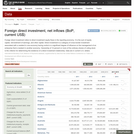
Data set and map pertaining to foreign direct investment for all countries. This series shows net inflows (new investment inflows less disinvestment) in the reporting economy from foreign investors. Data are in current U.S. dollars. The World Bank specifies foreign direct investment as a World

This course explores the foundations of policy making in developing countries. The goal is to spell out various policy options and to quantify the trade-offs between them. We will study the different facets of human development: education, health, gender, the family, land relations, risk, informal and formal norms and institutions. This is an empirical class. For each topic, we will study several concrete examples chosen from around the world. While studying each of these topics, we will ask: What determines the decisions of poor households in developing countries? What constraints are they subject to? Is there a scope for policy (by government, international organizations, or non-governmental organizations (NGOs))? What policies have been tried out? Have they been successful?
MITx Online Version
This course is part of the Micromaster’s Program in Data, Economics, and Design of Policy through MITx Online. The course is entirely free to audit, though learners have the option to pay a fee, which is based on the learner’s ability to pay, to take the proctored exam, and earn a course certificate. To access the course, create an MITx Online account and enroll in the course 14.740x Foundations of Development Policy.

Are you looking for FREE, semester-long economics, government, american history, and personal finance courses? If so, visit www.certell.org to download. Certell is an educational non-profit who's mission is to support and develop educational resources and technology that lower the cost of education and help individuals lead flourishing lives. We want to help schools and teachers thrive! All content meets national standards and most meet AP standards (when applicable).
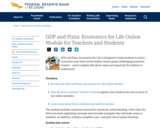
GDP and Pizza: Economics for Life is designed to help students in civics, economics and other social studies classes grasp challenging economic content – and to explain why these topics are important for citizens to understand.

This course will provide students with an analytic framework to understand the roles that gender, race, and class play in defining and determining access to leadership and power in the U.S., especially in the context of the workplace. We will explore women and men in leadership positions within the corporate, political and non-profit sectors, with attention to the roles of women of color and immigrant women within this context. We will also look at specific policies such as affirmative action, parental leave, child-care policy, and working-time policies and the role they play–or could play–in achieving parity. We will further investigate ways in which these policies address gender, racial, and class inequities, and think critically about mechanisms for change. The course will be highly interactive, and will combine texts, theater, videos and visual arts.

After decades of efforts to promote development, why is there so much poverty in the world? What are some of the root causes of inequality world-wide and why do poverty, economic transformations and development policies often have different consequences for women and men? This course explores these issues while also examining the history of development itself, its underlying assumptions, and its range of supporters and critics. It considers the various meanings given to development by women and men, primarily as residents of particular regions, but also as aid workers, policy makers and government officials. In considering how development projects and policies are experienced in daily life in urban and rural areas in Africa, Latin America, Asia and Melanesia, this course asks what are the underlying political, economic, social, and gender dynamics that make “development” an ongoing problem world-wide.
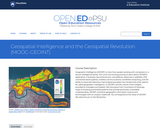
Geographic Intelligence (GEOINT) is more than people working with computers in a secure intelligence facility. Join us for this exciting journey to learn about GEOINT's application in business, law enforcement, and defense. Advances in satellites, GPS, unmanned aerial systems, wireless communications, handheld computing, and the ability to automate laborious map analysis processes has transformed what used to be called geographic intelligence, or GEOINT, and the nature of the insights provided to managers and leaders. We have gone from mountains of hardcopy maps to amazing automated systems that provide previously unavailable understanding. GEOINT combines geographic information science and technologies with an analytic tradecraft. You will experience the value of GEOINT. We welcome you to the Revolution.
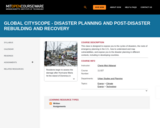
This class is designed to expose you to the cycles of disasters, the roots of emergency planning in the U.S., how to understand and map vulnerabilities, and expose you to the disaster planning in different contexts, including in developing countries.
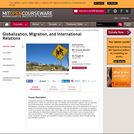
Tracing the evolution of international interactions, this course examines the dimensions of globalization in terms of scale and scope. It is divided into three parts; together they are intended to provide theoretical, empirical, and policy perspectives on source and consequences of globalization, focusing on emergent structures and processes, and on the implications of flows of goods and services across national boundaries – with special attention to the issue of migration, on the assumption that people matter and matter a lot. An important concern addressed pertains to the dilemmas of international policies that are shaped by the macro-level consequences of micro-level behavior. 17.411 fulfills undergraduate public policy requirement in the major and minor. Graduate students are expected to explore the subject in greater depth through reading and individual research.
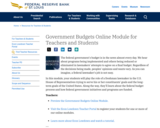
In this course, your students will play the role of a freshman lawmaker in the U.S. House of Representatives trying to serve his or her constituents' goals and the long-term goals of the United States. Along the way, they'll learn about the federal budget process and how federal government initiatives and programs are funded.
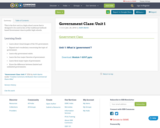
This is the first unit in a high school course that is designed to be used in lieu of the traditional textbook based Government class in public high schools.
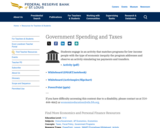
Students engage in an activity that matches programs for low-income people with the type of economic inequity the program addresses and observe an activity simulating tax payments and transfers.
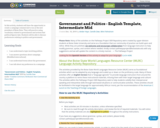
In this activity, students will have the opportunity to create a campaign commercial to run as the new president of Boise State. They will practice using vocabulary related to governments and actions that political figures take. Students will be able to discuss preferences relating to politics and government.